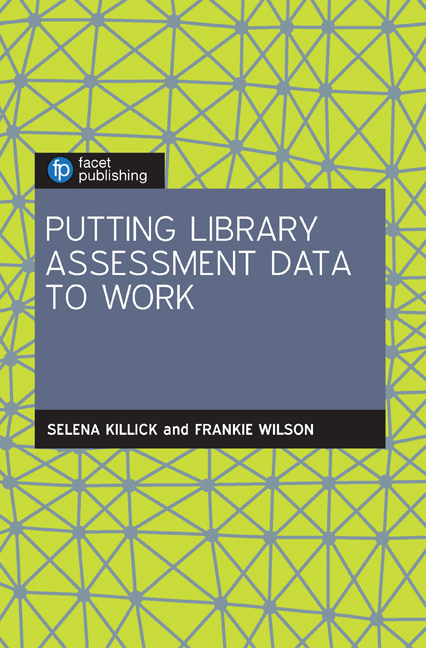Book contents
- Frontmatter
- Dedication
- Contents
- List of figures and tables
- List of case studies
- Authors and contributors
- Acknowledgements
- 1 Introduction to Library Assessment
- 2 Institutional Measures of Student Satisfaction
- 3 Standardised Library Surveys
- 4 In-House Library Surveys
- 5 Library Statistics
- 6 Qualitative Feedback
- 7 Emerging Techniques
- 8 More than Measuring: using Assessment Holistically
- 9 Conclusions
- Index
7 - Emerging Techniques
Published online by Cambridge University Press: 02 October 2019
- Frontmatter
- Dedication
- Contents
- List of figures and tables
- List of case studies
- Authors and contributors
- Acknowledgements
- 1 Introduction to Library Assessment
- 2 Institutional Measures of Student Satisfaction
- 3 Standardised Library Surveys
- 4 In-House Library Surveys
- 5 Library Statistics
- 6 Qualitative Feedback
- 7 Emerging Techniques
- 8 More than Measuring: using Assessment Holistically
- 9 Conclusions
- Index
Summary
Chapter overview
As our libraries continue to evolve, so too do library assessment techniques. Cutting edge techniques include econometric modelling (Tuomikoski, 2017) and big data (Xu et al., 2017), but in recent years usability testing, ethnographic research, user experience and library analytics have gradually become established in the field of library assessment. This chapter provides an overview of some of the emerging techniques and discusses how they could be applied locally.
The following case studies are presented in this chapter:
• Case Study 7.1 Working with students as partners to understand the needs of distance learners at the Open University (Sam Dick and Keren Stiles, Open University)
• Case Study 7.2 Small-scale user analysis; big library gains at Anglia Ruskin University (Norman Boyd and Hannah Fogg, Anglia Ruskin University)
• Case Study 7.3 Working hard or hardly working? Use of collaborative working space at the University of Bradford (Josie Field, Sarah George and Reshma Khan, University of Bradford).
Case Study 7.1 describes how Dick and Styles work with students to undertake usability testing of the online provision of Open University Library Services. Through setting up a 400–500 member student panel, there is always a group of willing participants ready to test if a proposed change or development improves the student experience. This has enabled the Library to make decisions faster and with more confidence.
As well as demonstrating Anglia Ruskin University Library's commitment to empowering frontline library staff, Case Study 7.2 describes how Boyd and Fogg supported teams of staff to undertake nine projects using five different user experience techniques. This had benefits for their users – directly as a result of changes made in response to the projects’ results, and indirectly by giving frontline staff the opportunity to interact with students outside the usual transactions.
In contrast, Field, George and Khan (Case Study 7.3) used multiple forms of observation in a single project. Their unobtrusive observation revealed previously unknown behaviour was taking place in one part of the library under inspection, which led to a more nuanced understanding of how users viewed that area. However, the results gave rise to a crucial question – were students working hard, or hardly working? Applying cyber-ethnographic research techniques alongside the observation showed that they were engaged in productive study sessions.
- Type
- Chapter
- Information
- Putting Library Assessment Data to Work , pp. 123 - 144Publisher: FacetPrint publication year: 2019

